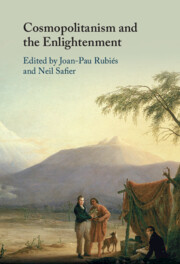Book contents
- Cosmopolitanism and the Enlightenment
- Cosmopolitanism and the Enlightenment
- Copyright page
- Dedication
- Contents
- Figures
- Contributors
- Preface
- Acknowledgments
- Introduction
- 1 Enlightenment Cosmopolitanism in Perspective
- 2 The Cosmopolitan Paradox
- 3 Diderot’s Conjectural History and the History of “Monstrous Nature”
- 4 Geographies of Cosmopolitanism
- 5 The Imperial, Global (Cosmopolitan) Dimensions of Nonelite Colonial Scribal Cultures in the Early Modern Iberian Atlantic
- 6 Gendered Cosmopolitanism?
- 7 Cosmopolitanism and the Creation of Patriotic Identities in the European Enlightenment
- 8 A Cosmopolitanism of Countervailing Powers
- 9 Cosmopolitanism and Civil War
- Afterword
- Index
1 - Enlightenment Cosmopolitanism in Perspective
Diversity, Natural Law, and Reason in the Work of John Locke
Published online by Cambridge University Press: 16 March 2023
- Cosmopolitanism and the Enlightenment
- Cosmopolitanism and the Enlightenment
- Copyright page
- Dedication
- Contents
- Figures
- Contributors
- Preface
- Acknowledgments
- Introduction
- 1 Enlightenment Cosmopolitanism in Perspective
- 2 The Cosmopolitan Paradox
- 3 Diderot’s Conjectural History and the History of “Monstrous Nature”
- 4 Geographies of Cosmopolitanism
- 5 The Imperial, Global (Cosmopolitan) Dimensions of Nonelite Colonial Scribal Cultures in the Early Modern Iberian Atlantic
- 6 Gendered Cosmopolitanism?
- 7 Cosmopolitanism and the Creation of Patriotic Identities in the European Enlightenment
- 8 A Cosmopolitanism of Countervailing Powers
- 9 Cosmopolitanism and Civil War
- Afterword
- Index
Summary
Recent theorizing about cosmopolitanism has emphasized the need to embrace diversity as a constituent element informing the shared value of cosmopolitanism. This development suggests the need for an alternative genealogy from received accounts which typically trace cosmopolitanism from the Stoics through Kant, on the premise of moral continuities and consensus. My chapter explores the work of John Locke and his engagement with scepticism as a different way of encountering diversity with implications for a reimagined cosmopolitanism. But Locke’s inheritance is not straightforward and presents as many dilemmas as solutions to the challenge of reconciling difference with universal commitments. His acceptance, at some level, of diversity is not the prelude to an expression of human solidarity, framed around a nascent cosmopolitan ideal. Locke’s ultimate pessimism on these matters is a reminder of the difficulties involved in the contemporary project of accommodating divergent philosophical forces.
- Type
- Chapter
- Information
- Cosmopolitanism and the Enlightenment , pp. 34 - 54Publisher: Cambridge University PressPrint publication year: 2023

